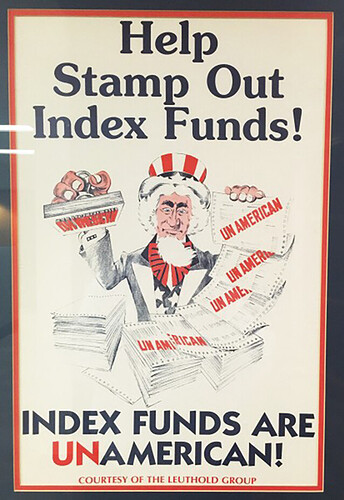Kan även rekommendera detta avsnitt med Craig Lazzara från SPIVA där vi tar upp det som Gardell säger om indexfonder. Lite tröttsamt faktiskt eftersom det ger media här och nu, men innehåller väldigt lite substans.
Vi tar specifikt upp det ca 1 timme in i intervjun. Direktlänk:
För att citera mer Lazzara där han går in på detta i mer detalj och stödjer @nightowls tes är i en intervju med CNBC tidigare i år:
One argument, however, has attracted some academic interest: that indexing could become so big that there will not be enough “active” trading of stocks and that the markets will therefore become “inefficient.”
If there is any truth to that, where would a peak occur? Are there any signs that we are reaching “peak indexing”?
Lazzara makes an important distinction between passive assets under management and passive trading. While passive assets under management are growing, passive trading is growing very slowly and is only a tiny fraction of overall trading.
In fact, passive managers don’t do much trading. Lazzara demonstrated that, assuming passive managers own a third of all the market’s assets, active managers still do 91% of the trading.
Lazzara’s conclusion: “The valuation of index constituents is ultimately decided by active managers (and some factor indices) whose trades are motivated by their own research.”
samt
But what about the other part of the question: could passive investing become so big that it will overwhelm active trading and make the markets “inefficient”?
Remember, Lazzara concluded that active managers still do 91% of the trading. For the share of active manager trades to drop below 50%, Lazzara estimates that passive investors would have to own 83% of all the market’s assets.
That would mean passive managers would have to go from owning roughly 30% of market assets now to 83%.
“And even at that level, there’s no a priori reason to assume that market efficiency would be impaired,” Lazzara said.
In plain English: we are a long way from passive investors controlling trading, if such a level exists.
Still, assuming that if active management becomes less than 50% of trading, the markets may become “inefficient” is just a guess.
Hela artikeln är mycket läsvärd på temat:
samt
Jag blir även lite trött eftersom:
- Givet att Gardell nu har rätt, då borde han ju bara vara tyst och låta oss idioter placera i indexfonder eftersom det borde göra att vi är förlorarna som köper felprissatta aktier till vilket pris som helst och då borde han kunna gör bättre affärer och pengarna borde gå till honom istället.
Eller, sagt på ett annat sätt:
- Om nu aktiva förvaltare är skickliga och marknaden är ineffektiv så får de fler möjligheter att tjäna pengar på bekostnad av oss andra och då kommer ju folk lämna indexfonder och placera pengar hos dem istället.
Så det kommer vara ganska självsanerande, men vi är inte i närheten av det än. Tvärtom ter det sig ju fortfarande som att aktiva förvaltare - till sin stora frustration - förlorar pengar till indexförvaltning. Det är ju typ den starkaste trenden det senaste decenniet och nu börjar ju till och med institutionella förvaltare fatta det.
Men ironin i det hela utifrån Gardells perspektiv blir ju som Lazzara skriver:
How will we know, at some future date, that markets are no longer sufficiently efficient? Presumably one of the indicia of market inefficiency would be a sufficiently large number of mispriced stocks, so that the value of successful active management would increase. This is a plausible outcome. But remember: the only source of outperformance for the outperformers is the underperformance of the underperformers. Active investment management remains a zero-sum game.
Even if we do approach peak passive, therefore, the active manager’s life will be no easier, and the benefits of indexing will be no less.


